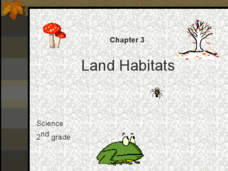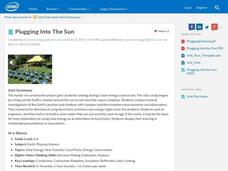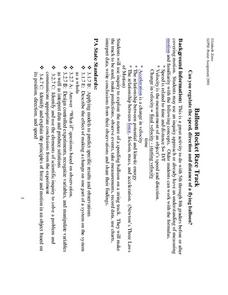Curated OER
Animals and Humans
Students identify the functions of various body parts. They participate in the "Head, Shoulders, Knees, and Toes" song, draw a picture of themselves and other mammals, and create a traced outline of their body that they add features to....
Curated OER
Describing Physical Appearance: ELL
In this physical descriptions ELL worksheet, students complete several activities to help them describe people. Students draw and read the descriptions aloud with a partner and to their class.
Curated OER
Land Habitats: Grade 3 Science
Build your students scientific vocabulary with this slide show on land habitats. Each slide provides a vocabulary word, image, and definition of a term common to habitats and the environment. Great for science class or as comprehensible...
Intel
Forensics: Get a Clue
Although the methods are all scientific, forensic science was started by police officers rather than scientists, who relied on observation and common sense. Young detectives use many tools to solve crimes around the school in a...
Curated OER
Teaching Science to English Language Learners
Use these hands on lesson plans to make science more accessible for English Language Learners in your classroom.
University of Texas
Matter and the Periodic Table Chemical Families and Periodic Trends
Is assembling the periodic table as simple as Tetris? Scholars arrange colored cards into a logical order and then make connections to the arrangement of the periodic table. Hands-on activities include adding trend arrows and analyzing...
Columbus City Schools
Experiencing Eclipses
Don't be caught in the dark! Young scientists investigate the causes of both solar and lunar eclipses using an interactive to help them understand the development of an eclipse over time. They then research facts and characteristics...
Curated OER
Bugs, Bugs, Everywhere!
Students collect and compare bugs using magnifying lenses and graph data based on their comparisons. In this bugs lesson plan, students also make an aspirator by using a jar, tubing, and screen.
Curated OER
Body Parts Vocabulary
Students identify the main parts of the human body. In this human body vocabulary lesson, students trace each other's body outline on butcher paper and label the parts of the body. Students define what each body part does. This lesson is...
Curated OER
Bats
Young scholars investigate bats. In this animal science lesson plan, students use several websites and suggested bat books to write an informative paragraph. Young scholars should be able to write with 90% accuracy.
Cornell University
Constructing and Visualizing Topographic Profiles
Militaries throughout history have used topography information to plan strategies, yet many pupils today don't understand it. Scholars use Legos and a contour gauge to understand how to construct and visualize topographic profiles. This...
Intel
Starquest
Almost every ancient culture observed the stars and saw pictures in the patterns. Studying stars allowed them to guide travelers, determine when to plant crops, when to harvest food, and the stories surrounding the images include some of...
Intel
Insects: The Good, The Bad, The Ugly
What would the world be like with no insects? Ponder this question using a research-based STEM unit that encourages scholars to investigate insects from both a beneficial and hazardous perspective. They learn about insect behaviors,...
Intel
Plugging into the Sun
What's cooking? A sizzling STEM unit challenges scholars to build a solar cooker that can successfully cook an egg. The unit opens with a study of Earth's rotation, the sun's energy, and shadows. Pupils use a compass and thermometer to...
Curated OER
Awesome Adaptations!
Second graders explore biology by researching animal characteristics. In this adaptation lesson, 2nd graders identify the history of several animals and research the changes that have occurred to their anatomy over thousands of years....
Curated OER
Unit Plan Template
Learners research the adaptations of desert animals and build their research skills. In this the adaptations of desert animals lesson plan, students describe major factors that desert animals have on their habitat. Learners...
Curated OER
Balloon Rocket Race Track
Students discuss "How can we measure (or make it easier to record) the speed, distance or acceleration of the balloon?" They told that they are going to make a balloon racetrack. Pupils use meter sticks to accurately measure length and...
Curated OER
It's Alive! Using Microorganisms in Cooking
Learners create a KWL chart about food. In this chemistry lesson, students differentiate physical and chemical changes. They explain how microorganisms are used in food preparation.
Curated OER
Scientists Create Energy-Making Artificial Leaf (29th March, 2011)
Students read an article about alternative energy and complete the associated worksheets. In this ESL/ELL alternative energy lesson, students read or listen an article about research at MIT in which scientists designed a energy-making...
Curated OER
Myths and Legends on Natural Disasters: Making Sense of Our World
Students explore different natural and manmade disasters through a webquest. In this earth science lesson, students explain their causes. They also discuss how disasters affect society.
Curated OER
Half Lives
Students investigate the concept of half-life by conducting an M&M experiment. In this chemistry lesson, students differentiate nuclear fusion and fission. They present investigation findings to class.
Curated OER
Habitat Hopscotch
Students analyze different habitats. In this habitat lesson, students evaluate what animals need in their habitats. Students participate in the game Habitat Hopscotch.
University of California
Energy and Biomass Pyramids
Young scientists play tag as they act out the food pyramid in the ocean ecosystem. Energy circles pass from the smaller prey to the predators and at the end of the activity, a data chart and analysis questions allow pupils to apply their...
Intel
Beat the Heat
Explore greenhouse effect and climate change through a 15-day unit. Scholars learn about these STEM concepts by researching, conducting surveys, experimenting, and collaborating with experts in the field. They frequently communicate...
Other popular searches
- Idioms for Ell Students
- Math for Ell Students
- Reading for Ell Students
- Lessons for Ell Students
- Vocabulary Ell Students
- Money for Ell Students
- Drama for Ell Students
- Treasure Chest Ell Students
- Bee Vocabulary Ell Students
- Nutrition for Ell Students
- Lesson Plans for Ell Students























